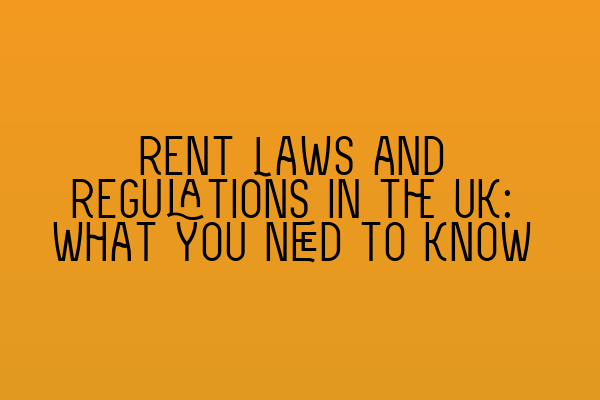Rent Laws and Regulations in the UK: What You Need to Know
As a property owner or tenant in the UK, it is essential to familiarize yourself with the various rent laws and regulations that govern the landlord-tenant relationship. Understanding these laws will not only help ensure your rights and responsibilities are protected but will also help you avoid legal troubles and financial implications. In this blog post, we will provide an overview of the key rent laws and regulations in the UK, highlighting what you need to know as both a landlord and a tenant.
1. Assured Shorthold Tenancy (AST):
The assured shorthold tenancy (AST) is the most common type of tenancy in the UK. It provides tenants with a legal basis to rent a property from a private landlord. Under an AST, tenants have certain rights, such as the right to live in a safe and habitable property, have their deposit protected in a government-approved scheme, and receive proper notice before any changes to the tenancy agreement are made.
2. Rent Increases:
Landlords have the right to increase the rent of a property, but they must follow specific rules and regulations. In most cases, landlords can only increase the rent once the current fixed-term tenancy has ended, and they must provide the tenant with proper notice before implementing the rent increase. It is also important to note that the rent increase cannot be deemed as excessive, and there are limits on how often and how much a landlord can increase the rent.
3. Tenancy Deposit Protection:
When a tenant provides a landlord with a deposit, it is essential for the landlord to protect it in a government-approved tenancy deposit scheme. This scheme ensures that tenants can get back their deposit at the end of the tenancy, provided they have met the agreed-upon terms and conditions. Failure to protect the deposit can lead to severe penalties for the landlord.
4. Repairs and Maintenance:
Both landlords and tenants have responsibilities when it comes to property repairs and maintenance. Landlords are legally obligated to maintain the structure and exterior of the property, as well as keep the heating, water, and sanitation systems in good working order. Tenants, on the other hand, are responsible for maintaining the cleanliness of the property and informing the landlord of any necessary repairs or maintenance issues.
5. Eviction and Notice Periods:
In certain circumstances, landlords may need to evict a tenant from their property. However, they must follow the proper legal procedures, which include providing the tenant with sufficient notice. The notice periods vary depending on the type of tenancy, so it is crucial to understand the specific requirements for your situation. It is advisable for both landlords and tenants to seek legal advice to ensure the eviction process is carried out correctly and within the boundaries of the law.
6. HMO Regulations:
HMO stands for House in Multiple Occupation, and it refers to a type of rental property where at least three individuals from different households share common areas, such as kitchens or bathrooms. Landlords of HMO properties must adhere to certain regulations, including obtaining the appropriate HMO license and meeting specific health and safety standards. Failure to comply with HMO regulations can result in hefty fines and potential legal consequences for the landlord.
7. Energy Performance Certificates (EPC):
Landlords in the UK are required to provide an energy performance certificate (EPC) to tenants before they move into the property. This certificate provides valuable information about the energy efficiency of the property and suggests ways to improve it. It is a legal requirement for landlords to maintain a minimum EPC rating, and failure to comply can lead to financial penalties.
It is crucial to note that this blog post provides only a brief overview of rent laws and regulations in the UK. To ensure full compliance and a clear understanding of your rights and obligations, it is advisable to consult with a solicitor specializing in property law.
For more information on preparing for the SQE exams, check out SQE 1 Practice Exam Questions and SQE 1 Practice Mocks FLK1 FLK2. If you are looking for preparation courses for the SQE exams, SQE 2 Preparation Courses and SQE 1 Preparation Courses are available to assist you in your studies. Additionally, stay informed about the upcoming SRA SQE Exam Dates to plan your exam preparation effectively.
Remember, staying informed and knowledgeable about the rent laws and regulations in the UK is vital for both landlords and tenants. By understanding your rights and responsibilities, you can ensure a smooth and legal rental experience.
